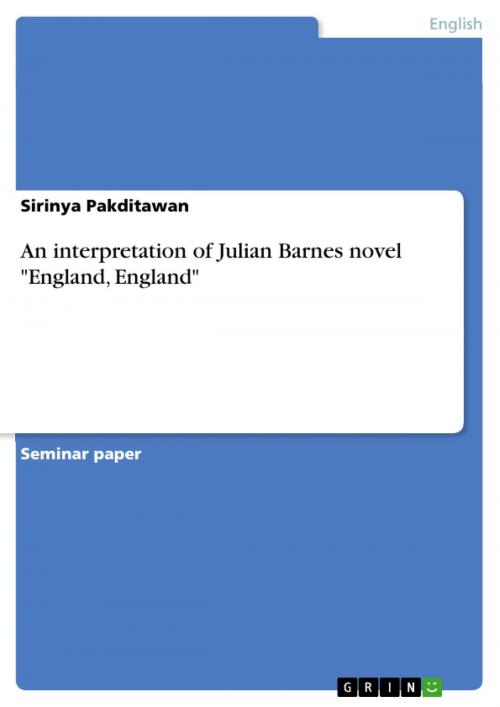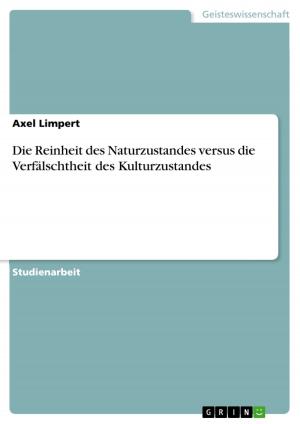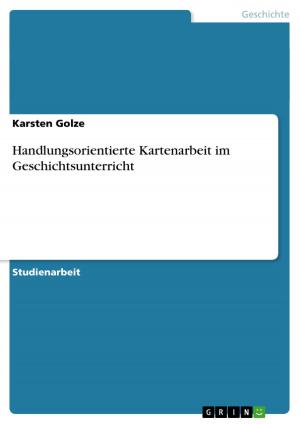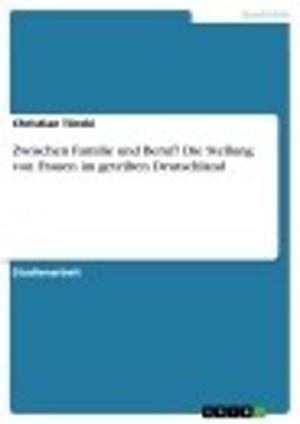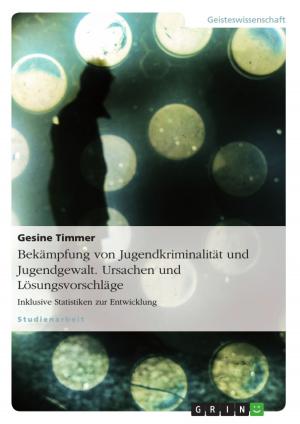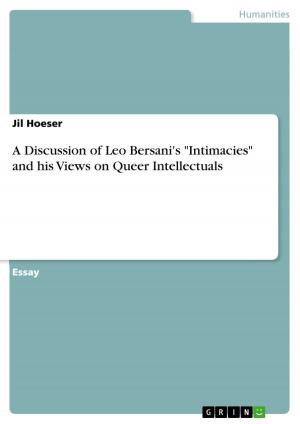An interpretation of Julian Barnes novel 'England, England'
Fiction & Literature, Literary Theory & Criticism, British| Author: | Sirinya Pakditawan | ISBN: | 9783638533164 |
| Publisher: | GRIN Verlag | Publication: | August 11, 2006 |
| Imprint: | GRIN Verlag | Language: | English |
| Author: | Sirinya Pakditawan |
| ISBN: | 9783638533164 |
| Publisher: | GRIN Verlag |
| Publication: | August 11, 2006 |
| Imprint: | GRIN Verlag |
| Language: | English |
Seminar paper from the year 2004 in the subject English Language and Literature Studies - Literature, grade: 1,0, University of Hamburg (Institut für Anglistik und Amerikanistik), course: Die englische Literatur der neunziger Jahre, 9 entries in the bibliography, language: English, abstract: Numerous contemporary British novels display an almost obsessive concern with the notion of Englishness. Hence, they focus on the myths, traditions and attitudes that are regarded as typically English. With its interest in Englishness, the nature of historical truth, and the blurring of boundaries between the authentic and the imitation, Julian Barnes' novel 'England, England' (1998), which was short-listed for the Booker prize in 1998, shares important concerns with many contemporary British novels. Hence, this novel shows all the features characteristic of postmodernist historiographic metafiction. That is to say, like other historiographic metafictions, 'England, England' is 'both intensely self-reflexive and yet paradoxically also lay[s] claim to historical events and personages'. What is more, Barnes' novel also reflects the feature which has been the major focus of attention in most of the critical work on postmodernism, i.e. a self-conscious assessment of the status and function of narrative in literature, history, and theory: 'its theoretical self-awareness of history and fiction as human constructs (historiographic metafiction) is made the grounds for its rethinking and reworking of the forms and contents of the past'. One might be justified in saying that Barnes' novel explores, constructs, parodies, and deconstructs the 'invented traditions' known as 'Englishness'. The novel incorporates a great number of different traces of the English cultural past, including many myths and legends, juxtaposes competing versions of and discourses about Englishness. Additionally, it also explores the complexity of any account of a nation's organically grown cultural memory and identity. Therefore, Barnes' novel does not only express a wide range of versions of Englishness, but also offers self-conscious reflections upon both the invention of cultural traditions and the questionable notion of historical authenticity. Hence, in the following analysis, it will be examined how 'England, England' thematizes and explores the invention of cultural traditions, by constructing and deconstructing 'Englishness'. Thus, it will be primarily focussed on Barnes' fictional exploration of those invented traditions known as 'Englishness' and shown how the content and the form of this novel self-consciously examine and deconstruct the notion of authenticity.
Seminar paper from the year 2004 in the subject English Language and Literature Studies - Literature, grade: 1,0, University of Hamburg (Institut für Anglistik und Amerikanistik), course: Die englische Literatur der neunziger Jahre, 9 entries in the bibliography, language: English, abstract: Numerous contemporary British novels display an almost obsessive concern with the notion of Englishness. Hence, they focus on the myths, traditions and attitudes that are regarded as typically English. With its interest in Englishness, the nature of historical truth, and the blurring of boundaries between the authentic and the imitation, Julian Barnes' novel 'England, England' (1998), which was short-listed for the Booker prize in 1998, shares important concerns with many contemporary British novels. Hence, this novel shows all the features characteristic of postmodernist historiographic metafiction. That is to say, like other historiographic metafictions, 'England, England' is 'both intensely self-reflexive and yet paradoxically also lay[s] claim to historical events and personages'. What is more, Barnes' novel also reflects the feature which has been the major focus of attention in most of the critical work on postmodernism, i.e. a self-conscious assessment of the status and function of narrative in literature, history, and theory: 'its theoretical self-awareness of history and fiction as human constructs (historiographic metafiction) is made the grounds for its rethinking and reworking of the forms and contents of the past'. One might be justified in saying that Barnes' novel explores, constructs, parodies, and deconstructs the 'invented traditions' known as 'Englishness'. The novel incorporates a great number of different traces of the English cultural past, including many myths and legends, juxtaposes competing versions of and discourses about Englishness. Additionally, it also explores the complexity of any account of a nation's organically grown cultural memory and identity. Therefore, Barnes' novel does not only express a wide range of versions of Englishness, but also offers self-conscious reflections upon both the invention of cultural traditions and the questionable notion of historical authenticity. Hence, in the following analysis, it will be examined how 'England, England' thematizes and explores the invention of cultural traditions, by constructing and deconstructing 'Englishness'. Thus, it will be primarily focussed on Barnes' fictional exploration of those invented traditions known as 'Englishness' and shown how the content and the form of this novel self-consciously examine and deconstruct the notion of authenticity.
